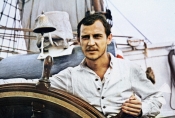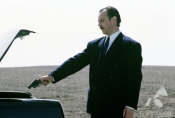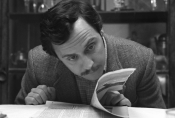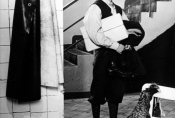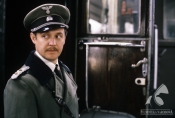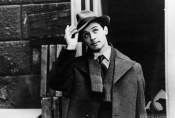Marek Kondrat
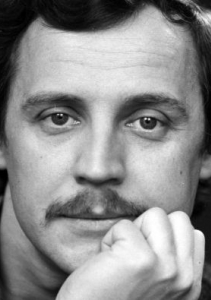
He appeared in over a hundred films and television series. In 2007, he publicly declared that he was retiring as an actor. Three years later, however, he returned with a role in Mała matura 1947 [Little baccalaureate 1947] (2010), directed by Janusz Majewski, his close friend. It is hoped that he will return yet again to a profession which brought him such huge success.
He born on October 18, 1950 in Krakow. He is a graduate of the Acting Department of the State Higher School of Theatre in Warsaw (1972). After graduation, he worked in the Stanisław Wyspianski Theatre in Katowice (1972-1973) and then moved to Warsaw, appearing on the stages of several theatres: Dramatyczny (1973-1984), Nowy (1985-1986) and Ateneum (1992-1999).
He made his screen debut as an eleven-year-old boy in 1961, playing the role of Wawrzko, a pupil of Veit Stoss, in a film version of the novel by Antonina Domanska – Historia żółtej ciżemki/Story of the Golden Boot, directed by Sylwester Chęciński. His next such prominent role came ... fourteen years later, when he was cast as Romek Boryczko, the protagonist of Zaklęte rewiry/Enchanted Stations (1975) by Janusz Majewski, and based on the novel by Henryk Worcell. The performance earned him a Golden Camera for best debut awarded by the weekly “Film” (1976) and another award at a festival in Panama (1977).
Then, Andrzej Wajda cast him as Captain Joseph Conrad-Korzeniowski in his adaptation of Smuga cienia/The Shadow Line (1976). The actor and the director met again years later on the set of Danton (1982), with Kondrat as Barer de Vieusac, and then again, in Pan Tadeusz (1999) – Kondrat played the Count. In 1981, he played a man named Grzęda in Wajda’s Człowiek z żelaza/Man of Iron, but his character was cut in the final version; still, the director was so impressed that he included the actors’s name in the credits, even though he does not appear in it.
In 1981, he gave one of his best performances to date – the teacher in Dreszcze/Shivers (1981) by Wojciech Marczewski, a story of growing up in a unique time; the film is set at a youth camp in 1955. He was reunited with the director nearly twenty years later, playing Paweł Heller, the main character in Weiser (2000), a forty-year-old man trying to reconstruct some mysterious event from his own childhood. The film was inspired by the famous novel “Weiser Dawidek” by Paweł Huelle. The author later said that while not faithful to the book’s letter, the adaptation is faithful to its spirit.
In 1984, he filmed Dom wariatów/The House of Fools, a dazzling feature debut of Marek Koterski, which marked the first time Kondrat portrayed Adam Miauczyński. He reprised the role in Dzień świra/Day of the Wacko (1995) and Wszyscy jesteśmy Chrystusami/We're All Christs (2006). For his role in Dzień świra/Day of the Wacko, one day in the life of Adas, who is an obsessive-compulsive and cannot accept himself, still dreaming as he does of great love, although lacking the courage to seek it, Kondrat won the award in Gdynia (2002) and the “Eagle” (2003). Seven years before that, he had won the Grand Prix in Gdynia for the title role in Pułkownik Kwiatkowski/Colonel Kwiatkowski (1995) by Kazimierz Kutz, a brilliant story about a doctor pretending to be a communist colonel in the Soviet-occupied Polish post-war reality.
Marek Kondrat is an excellent and versatile actor, capable of switching the tone of his performance at the drop of a hat, oscillating between a serious mood and slapstick comedy. Here are some examples of his roles: private Jan Kania in C.K. Dezerterzy/CK Deserters (1985) by Janusz Majewski, Olo Żwirski, a verified security agent in Psy/Dogs (a.k.a. Pigs, 1992) by Władysław Pasikowski, Marek Kossot in Nocne graffiti/Night Graffiti (1996) by Maciej Dutkiewicz, the revenge-seeking father of a raped girl in Prawo ojca/Father’s Law (1999), which he also directed, Old in Trzeci/The Third (2004) by Jan Hryniak, inspired by Knife in the water by Roman Polański, or Commissar Olgierd Halski of the popular TV series Ekstradycja/Extradition by Wojciech Wojcik (1995-1998).
“I think it is good to leave the place when there is still one coat left hanging in the cloak room, as Wojciech Młynarski sang. To leave people with a good memory about yourself, and not deplete the supply of their trust in you,” the actor concluded in an interview (2011).
Jerzy Armata
Selected filmography
-
1981
MAN OF IRON
reż. Andrzej Wajda
-
1981
SHIVERS
reż. Wojciech Marczewski
-
1991
POLISH CUISINE
reż. Jacek Bromski
-
1992
THE DOGS (THE PIGS)
reż. Władysław Pasikowski
-
2002
THE DAY OF THE WACKO
reż.
